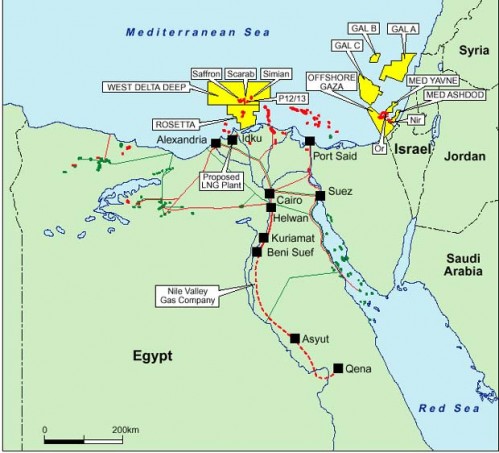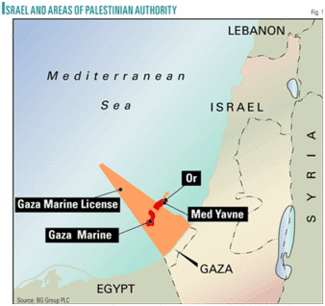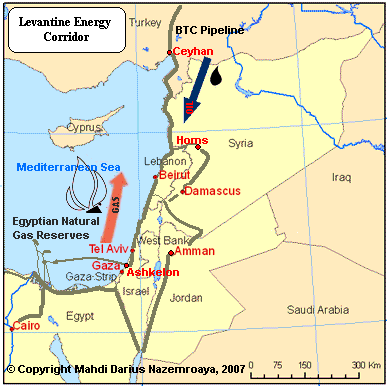
by Michel Chossudovsky
Global Research
January 8, 2009
from
GlobalResearch Website
The military invasion of the Gaza Strip by Israeli Forces bears a direct
relation to the control and ownership of strategic offshore gas reserves.
This is a war of conquest. Discovered in 2000, there are extensive gas
reserves off the Gaza coastline.
British Gas (BG Group) and its partner, the Athens based
Consolidated
Contractors International Company (CCC) owned by Lebanon's Sabbagh and Koury
families, were granted oil and gas exploration rights in a 25 year agreement
signed in November 1999 with the Palestinian Authority.
The rights to the offshore gas field are respectively British Gas (60
percent); Consolidated Contractors (CCC) (30 percent); and the Investment
Fund of the Palestinian Authority (10 percent). (Haaretz, October 21, 2007)
The PA-BG-CCC agreement includes field development and the construction of a
gas pipeline. (Middle East Economic Digest, Jan 5, 2001)
The BG license covers the entire Gazan offshore marine area, which is
contiguous to several Israeli offshore gas facilities (see Map below). It
should be noted that 60 percent of the gas reserves along the Gaza-Israel
coastline belong to Palestine.
The BG Group drilled two wells in 2000: Gaza Marine-1 and Gaza Marine-2.
Reserves are estimated by British Gas to be of the order of 1.4 trillion
cubic feet, valued at approximately 4 billion dollars. These are the figures
made public by British Gas.
The size of Palestine's gas reserves could be
much larger.

Map 1

Map 2
Who Owns the Gas Fields
The issue of sovereignty over Gaza's gas fields is crucial. From a legal
standpoint, the gas reserves belong to Palestine.
The death of Yasser Arafat, the election of the
Hamas
government and the
ruin of the Palestinian Authority have enabled Israel to establish de facto
control over Gaza's offshore gas reserves.
British Gas (BG Group) has been dealing with the Tel Aviv government. In
turn, the Hamas government has been bypassed in regards to exploration and
development rights over the gas fields.
The election of Prime Minister Ariel Sharon in 2001 was a major turning
point. Palestine's sovereignty over the offshore gas fields was challenged
in the Israeli Supreme Court. Sharon stated unequivocally that "Israel would
never buy gas from Palestine" intimating that Gaza's offshore gas reserves
belong to Israel.
In 2003, Ariel Sharon, vetoed an initial deal, which would allow British Gas
to supply Israel with natural gas from Gaza's offshore wells. (The
Independent, August 19, 2003)
The election victory of Hamas in 2006 was conducive to the demise of the
Palestinian Authority, which became confined to the West Bank, under the
proxy regime of Mahmoud Abbas.
In 2006, British Gas,
"was close to signing a deal to pump the gas to Egypt."
(Times, May, 23, 2007)
According to reports, British Prime Minister Tony
Blair intervened on behalf of Israel with a view to shunting the agreement
with Egypt.
The following year, in May 2007, the Israeli Cabinet approved a proposal by
Prime Minister Ehud Olmert "to buy gas from the Palestinian Authority." The
proposed contract was for $4 billion, with profits of the order of $2
billion of which one billion was to go the Palestinians.
Tel Aviv, however, had no intention on sharing the revenues with Palestine.
An Israeli team of negotiators was set up by the Israeli Cabinet to thrash
out a deal with the BG Group, bypassing both the Hamas government and the
Palestinian Authority:
"Israeli defense authorities want the Palestinians to be paid in goods and
services and insist that no money go to the Hamas-controlled Government."
The objective was essentially to nullify the contract signed in 1999 between
the BG Group and the Palestinian Authority under Yasser Arafat.
Under the proposed 2007 agreement with BG, Palestinian gas from Gaza's
offshore wells was to be channeled by an undersea pipeline to the Israeli
seaport of Ashkelon, thereby transferring control over the sale of the
natural gas to Israel.
The deal fell through. The negotiations were suspended:
"Mossad Chief Meir Dagan opposed the transaction on security grounds, that
the proceeds would fund terror".
(Member of Knesset Gilad Erdan, Address to
the Knesset on "The Intention of Deputy Prime Minister Ehud Olmert to
Purchase Gas from the Palestinians When Payment Will Serve Hamas," March 1,
2006, quoted in Lt. Gen. (ret.) Moshe Yaalon,
Does the Prospective Purchase
of British Gas from Gaza's Coastal Waters Threaten Israel's National
Security? Jerusalem Center for Public Affairs, October 2007)
Israel's intent was to foreclose the possibility that royalties be paid to
the Palestinians.
In December 2007, The BG Group withdrew from the
negotiations with Israel and in January 2008 they closed their office in Israel.
(BG website)
Invasion Plan on The Drawing Board
The invasion plan of the Gaza Strip under "Operation Cast Lead" was set in
motion in June 2008, according to Israeli military sources:
"Sources in the defense establishment said Defense Minister Ehud Barak
instructed the Israel Defense Forces to prepare for the operation over six
months ago [June or before June] , even as Israel was beginning to negotiate
a ceasefire agreement with Hamas."
(Barak Ravid,
Operation "Cast Lead":
Israeli Air Force strike followed months of planning, Haaretz, December 27,
2008)
That very same month, the Israeli authorities contacted British Gas, with a
view to resuming crucial negotiations pertaining to the purchase of Gaza's
natural gas:
"Both Ministry of Finance director general Yarom Ariav and Ministry of
National Infrastructures director general Hezi Kugler agreed to inform BG of
Israel's wish to renew the talks.
The sources added that BG has not yet officially responded to Israel's
request, but that company executives would probably come to Israel in a few
weeks to hold talks with government officials."
(Globes online- Israel's
Business Arena, June 23, 2008)
The decision to speed up negotiations with British Gas (BG Group) coincided,
chronologically, with the planning of the invasion of Gaza initiated in
June. It would appear that Israel was anxious to reach an agreement with the
BG Group prior to the invasion, which was already in an advanced planning
stage.
Moreover, these negotiations with British Gas were conducted by the Ehud
Olmert government with the knowledge that a military invasion was on the
drawing board. In all likelihood, a new "post war" political-territorial
arrangement for the Gaza strip was also being contemplated by the Israeli
government.
In fact, negotiations between British Gas and Israeli officials were ongoing
in October 2008, 2-3 months prior to the commencement of the bombings on
December 27th.
In November 2008, the Israeli Ministry of Finance and the Ministry of
National Infrastructures instructed Israel Electric Corporation (IEC) to
enter into negotiations with British Gas, on the purchase of natural gas
from the BG's offshore concession in Gaza.
"Ministry of Finance director general
Yarom Ariav and Ministry of National
Infrastructures director general Hezi Kugler wrote to IEC CEO Amos Lasker
recently, informing him of the government's decision to allow negotiations
to go forward, in line with the framework proposal it approved earlier this
year.
The IEC board, headed by chairman Moti Friedman, approved the principles of
the framework proposal a few weeks ago. The talks with BG Group will begin
once the board approves the exemption from a tender."
(Globes Nov. 13, 2008)
Gaza and Energy Geopolitics
The military occupation of Gaza is intent upon transferring the sovereignty
of the gas fields to Israel in violation of international law.
-
What can we expect in the wake of the invasion?
-
What is the intent of Israel with regard to Palestine's Natural Gas
reserves?
-
A new territorial arrangement, with the stationing of Israeli and/or
"peacekeeping" troops?
-
The militarization of the entire Gaza coastline, which is strategic for
Israel?
-
The outright confiscation of Palestinian gas fields and the unilateral
declaration of Israeli sovereignty over Gaza's maritime areas?
If this were to occur, the Gaza gas fields would be integrated into Israel's
offshore installations, which are contiguous to those of the Gaza Strip.
(See Map 1 above).
These various offshore installations are also linked up to Israel's energy
transport corridor, extending from the port of Eilat, which is an oil
pipeline terminal, on the Red Sea to the seaport - pipeline terminal at
Ashkelon, and northwards to Haifa, and eventually linking up through a
proposed Israeli-Turkish pipeline with the Turkish port of Ceyhan.
Ceyhan is the terminal of the Baku, Tblisi Ceyhan Trans Caspian pipeline.
"What is envisaged is to link the BTC pipeline to the Trans-Israel Eilat-Ashkelon
pipeline, also known as Israel's Tipline."
(See Michel Chossudovsky,
The War
on Lebanon and the Battle for Oil, Global Research, July 23, 2006)




